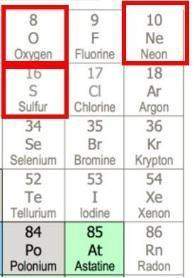
Which of the following is true about oxygen (o), sulfur (s) and neon (ne)? (choose 3)
a. oxygen and neon are in the same group and have the same number of valence electrons.
b. oxygen and sulfur are in the same period and have the same number of electron shells.
c. oxygen and neon are in the same period and have the same number of electron shells.
d. oxygen and sulfur have the same number of valence electrons.
e. oxygen and sulfur are most similar because they are in the same family and have similar chemical properties.
f. oxygen and neon have similar chemical properties.


Answers: 1
Other questions on the subject: Chemistry

Chemistry, 21.06.2019 22:30, bartfrank447
Joseph has hypothesized that sound travels in waves. if he were following the scientific method, what should he do next? a. ask a question. b. test the hypothesis. c. study the results. d. tell other scientists about his hypothesis.
Answers: 1

Chemistry, 22.06.2019 04:00, nothingworksoutforme
The image shows a process that releases nuclear energy which statement best identifies the process shown the process must be fusion because energy is released the process must be fusion because of have your nucleus formed a smaller nuclei the process must be fission because a large nucleus breaks into smaller nuclei the process must be fission because neutrons are formed
Answers: 1

Chemistry, 22.06.2019 06:30, yolo123321
The following reaction shows sodium carbonate reacting with calcium hydroxide. na2co3 + ca(oh)2 → naoh + caco3 how many grams of naoh are produced from 20.0 grams of na2co3? (molar mass of na = 22.989 g/mol, c = 12.01 g/mol, o = 15.999 g/mol, ca = 40.078 g/mol, h = 1.008 g/mol) 12.2 grams 15.1 grams 24.4 grams 30.2 grams
Answers: 2
Do you know the correct answer?
Which of the following is true about oxygen (o), sulfur (s) and neon (ne)? (choose 3)
a. oxyg...
a. oxyg...
Questions in other subjects:


















